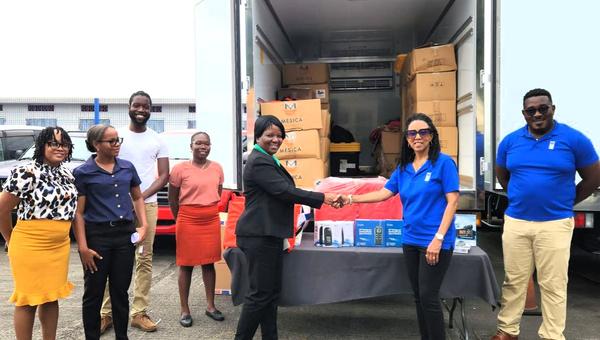Prevention, Recovery and Resilience
The geographic size, small populations, dependent economies and fragile and intricate connections between ecosystems and livelihoods, have immense implications for the sustainability of Caribbean nations making these islands particularly vulnerable to hazards.
Tackling the dual threats of climate change and hazards is essential in order to achieve the Sustainable Development Goals (SDGs) and eradicate poverty and inequality. UNDP Barbados and the Eastern Caribbean has been supporting countries in building resilience and ensuring that all development is risk-informed. In so doing, countries and communities are better able to protect against losses while simultaneously, bolstering economic growth, creating jobs, improving livelihoods, and ensuring that no one is left behind.
UNDP’s support to countries on resilience and recovery is shaped by two important global agreements: the Sendai Framework on Disaster Risk Reduction, and the 2030 Agenda for Sustainable Development. At the regional level, the Comprehensive Disaster Management Strategy is the overarching framework guiding the work of countries. In collaboration with partners our office also supports countries in reducing the risk of disasters and, where needed, supporting resilient disaster recovery. Taken all together, these efforts certify that the path towards sustainable development is risk-informed, zero-carbon and resilient.
UNDP led the response to the devastation of Hurricanes Maria and Irma in 2017 through a wide range of relief and recovery efforts, including post-disaster needs assessments, the successful delivery of livelihood support programmes (cash-for-work projects for debris removal), the restoration of homes and key social infrastructure as well as the development of institutional mechanisms to mobilise resources for building long-term climate resilience. In the immediate aftermath of the hazard, UNDP established Project Offices to implement recovery programmes in Dominica as well as Antigua and Barbuda which are still operational. Similarly, a UNDP project office in the BVI is to be established in 2021.
A significant allocation of social and economic resources is required to rebuild following the impact of powerful high-intensity storms. It is therefore imperative that the UNDP MCO continues to focus efforts on enhancing preparedness measures as well as building resilience in order to capably and swiftly recover from devastation. Additionally, recent extreme weather events have continued to highlight the differential effects of hazard impacts on women and men and have consequently underscored the need to address systemic inequalities and design policies that respond to post-crisis needs. Developing national policies that encourage greater participation and representation of women in all levels of decision-making will be critical in empowering women to be more actively involved in the creation of measures that will build long-term resilience to hazards. The design of policies and programmes that provide protection and ensure equality for women in the event of hazards, including the provision of access to financing, insurance, landownership, banking rights and other critical areas, will be paramount. Adaptive social protection systems and income support mechanisms that respond adequately to shocks, will be needed so that the most vulnerable women and men in island-states can prepare for and recover from disasters.
The Caribbean Disaster Emergency Management Agency (CDEMA), with HQ in Barbados is a natural partner for disaster preparedness and response. However, and despite multiple attempts, additional opportunities for further collaboration still need to be explored. It should also be noted that, in the last few years, CDEMA has announced its
intention to lead or set standards for recovery in the region. It will be important to have further discussions with this agency as it is hoped that the Caribbean Resilient Recovery Facility (CRRF) will be significantly advanced during this year.
The novel Coronavirus is an unprecedented worldwide crisis affecting all countries in a myriad of ways. There is global uncertainty on the duration of the crisis and depth of impact on the deterioration of livelihoods, increase in hunger, access to markets and the economy.
The office has responded in three stages namely:
1. Readiness:
- Strengthening the first line of defense so health systems can be better prepared to respond to the public health challenges.
2. Response:
- Flatten the curve, by supporting governments with slowing the rate of virus spread.
- Provide stimulus for business so companies maintain continuity and provide workers with an income.
3. Recovery:
- Conduct impact assessments that, with solid data, lead to evidence-based decisionmaking processes.
Projects implemented under the Prevention, Recovery and Resilience cluster include:
Explore More

 Locations
Locations














